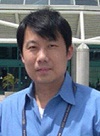
Jiangsu Henrui Medicine Co., Ltd. Ph.D., Vice President & CEO, R&D Center
演讲主题:Cancer Immunotherapy: Delivering the Promise——癌症免疫疗法:承诺的实现
Recent breakthroughs in treating different types of advanced-stage malignancies by harnessing self immunity against neoplastic cells showed a great promise of immunotherapy for cancer treatment. Various strategies have been employed to unleash, enhance or elicit anticancer immune reactions, which include T-cell checkpoint blockade, engineered T cells, BiTE, modified cytokines and cancer vaccines. This presentation will review recent progress in cancer immunotherapy and discuss some immunotherapeutic agents discovered and developed at HengRui Medicine Co., Ltd.

Livzon MabPharm Ph.D., General Manager
演讲主题:Update on Recent Regulatory Changes for Biologics Development in China——中国生物制剂研发的最新监管变化
Over the past several years, the biotech industry in China has experienced tremendous growth, both in biosimilars and innovative biologics. In the meantime, the CFDA is also going through significant reforms with respect to guidance and the reviewing process for development of both biosimilars as well as innovative biologics. In this presentation, the author intends to provide an update on the recent development in CFDA’s guidance for biologics development in China, and how the biotech industry can best position itself to take advantage of the recent regulatory changes.

MedImmune/AstraZeneca Ph.D., CTO
演讲主题:Engineering the Next-Generation Antibody-Drug Conjugates for Cancer Therapy——用于癌症治疗的新一代抗体偶联药物
Linking of highly potent cytotoxic warheads to tumor-targeting antibodies has the potential to attack tumors with missile-like precision and avoid toxicity to normal tissues. However, clinical observations indicate that the therapeutic window of most antibody-drug conjugates (ADCs) remains narrow. I will discuss our efforts in developing next-generation ADC technology which seeks to address the short-comings observed with current ADCs and help realize the full potential of this drug class to provide new breakthrough agents for the treatment of cancer.

Biosciences Division, Los Alamos National Laboratory MBBS, Ph.D., Research Scientist and Group Leader
演讲主题: AT THE CROSSROADS:GETTING TO REPRODUCIBLE RESEARCH ANTIBODIES——站在十字路口:如何获得可重复研究的抗体
Researchers all over the world routinely use antibodies, a critical class of commercially supplied reagents that are frequently unreliable. This situation affects reproducibility in biomedical research, wastes millions of dollars annually, and may affect clinical trials. This talk will provide an overview of the problem, argue that the time has come to express antibodies recombinantly and refer to them by their sequences, and provide possible ways to get to this ideal.

Senior Vice President & Scientific Director, Genmab Ph.D.,
演讲主题:Developing Antibody-Drug Conjugates for the Treatment of Solid Cancers——抗体偶联药物治疗实体肿瘤的进展
Therapeutic antibodies have revolutionized the treatment of cancer. However, many patients still fail to respond or become resistant to targeted treatment and novel innovative approaches to improve therapy are therefore required. Chemical engineering of antibodies, fueled by recent molecular insights, is providing important opportunities for the development of more potent antibody therapeutics. The progress in two antibodydrug conjugate programs from Genmab’s portfolio will be highlighted.

Antibody and ADC Physico-Chemistry, Centre d’Immunologie Pierre Fabre, France Ph.D., Senior Director,
演讲主题:KEYNOTE PRESENTATION: CUTTING-EDGE MASS SPECTROMETRY METHODS FOR ANTIBODY,BIOSIMILAR, BISPECIFIC AND ANTIBODY-DRUG CONJUGATES STRUCTURAL ASSESSMENT——抗体的尖端质谱法,双特异性生物仿制和抗体药物共轭结构的评估
A plethora of new mass spectrometry (MS) methods are used for antibody structural characterization and for biosimilarity assessment. In addition, these techniques are used to design and optimize more sophisticated and potent antibody derivatives such as ADCs (OptimADCs), bi- and multispecific antibodies, and controlled mixture of antibodies. Case studies based on state-of-the art MS methods such as Native and Ion-Mobility MS, Top-Down Sequencing, Proteomics and Sheathless Capillary Electrophoresis−Tandem MS will be presented and discussed.

Rensselaer Polytechnic Institute Ph.D., Richard Baruch M.D. Career Development Asso
演讲主题:Improved Methods for Designing and Evolving Antibodies——抗体设计和进化的改良方法
The biotech industry has seen an explosion in the development of therapeutic antibodies in the last decade. The advantages of antibodies are
compelling. Nevertheless, there are many challenges associated with antibody selection and engineering that require key technical advances to
simplify the rapid and reliable generation of potent antibody therapeutics. I will discuss.

Institute of Cell Biology and Immunology, University of Stuttgart Ph.D., Professor, Biomedical Engineering
演讲主题:Engineering Principles to Generate Multivalent Antibody-TRAIL Fusion Proteins——多价抗体-TRAIL融合蛋白的制造工程原则
Fusion of TRAIL to antibody fragments has been shown to allow for a targeted delivery and the selective induction of tumor cell death.
We have engineered optimized single-chain derivatives of TRAIL (scTRAIL), which were employed to develop novel multivalent antibody-scTRAIL
fusion proteins with improved properties. These multivalent fusion proteins were generated employing either scFv-driven homodimerization or
various separate homodimerization modules. Targeting and controlled dimerization of scTRAIL fusion proteins provides a strategy to enforce
apoptosis induction, together with retained tumor selectivity and good in vivo tolerance.

Biochemistry and Molecular Biology, Institute of Biotechnology and Biomedicine, University of Barcelona Ph.D., Professor
演讲主题:DESIGNING PROTEIN SOLUBILITY——设计蛋白
One of the major challenges that one should face during the development of protein-based biopharmaceuticals is their inherent propensity to aggregate. Indeed, protein therapeutic agents are both stored and typically administered at very high concentrations. Under these conditions they can easily aggregate, impacting the product’s developability, stability, formulation, and immunogenicity. I will discuss how computationally-assisted design of protein structures solubility is helping us to overcome these limitations.






